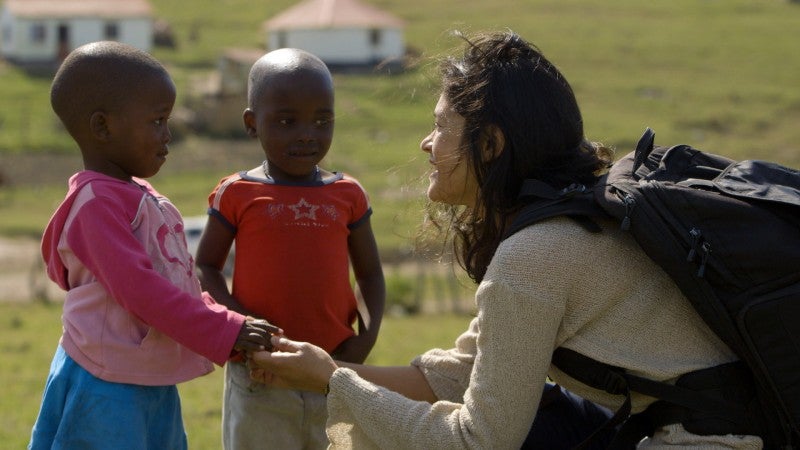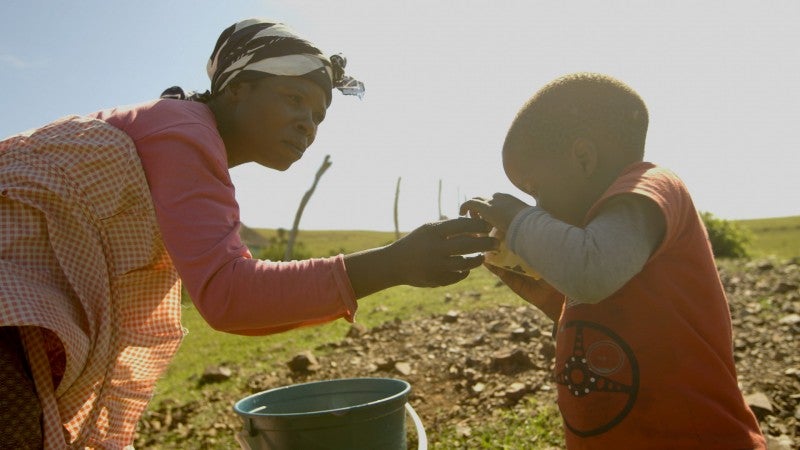*This piece originally appeared on The Huffington Post.
Africa Leadership Initiative/ South Africa Fellow Réjane Woodroffe is the winner of the seventh annual John P. McNulty Prize for her project the Bulungula Incubator (BI). Woodroffe left her career as an economist and investment manager to co-found the Bulungula Incubator, which uses a bottom-up model to transform marginalized communities. In partnership with community members, the Bulungula Incubator has created a world-class preschool education system; provided access to health care, employment, and clean water; and much more. Building upon Bulungula’s carefully documented successes, Réjane and her team are now poised to replicate their model beyond South Africa’s Eastern Cape.
Woodroffe and the Bulungula Incubator will be recognized as the winner of the 2014 John P. McNulty prize in a special event in New York City tonight.
What is poverty?
Poverty is not just you without resources. People sometimes say: “I know what it is to be poor: I was a student without any cash and had to struggle.” There is often a misperception that a person living in poverty is just you — a middle class Westerner — without money or assets. People remember when they were students living off their waitressing income and imagine that if they were parachuted into poverty in a rural village, they would be able to work through the challenges in some methodical way and make a plan to survive.
However, being born into poverty is more than just the circumstance of not having enough money to buy food or other material items. The effects of poverty are compounded in South Africa, where generations lived under Apartheid and colonialism, leading to an internalized sense of being inferior. Here, poverty is also about not understanding why a clear glass of water can cause a child to die of diarrhea, or why disease is not caused by spirits.

Woodroffe with children in South Africa.
Poverty is not having the confidence to challenge a teacher about their absenteeism simply because the teacher holds a position of authority, not being able to do basic arithmetic, not being able to read or write, not being able to speak an international language, and not having access to any outside information. It means no books or Internet in your home, no family members who studied further than primary school, no contacts in the corporate, government, or NGO world who could help you find a job or solve a problem. It means you see little evidence that education is a path to success, as the most successful people in your community are not the relatively well-educated people but rather those mostly illiterate family members brave enough to work 3 kilometers underground in the gold or platinum mines. It means never having seen anyone start their own business besides those selling basic groceries, and not knowing that the nutrition of your mother when she is pregnant will impact your ability to learn and earn throughout your life, and not even knowing what kind of nutrition that should be. This is what I am working to transform through our model.
The story of the Sicawu** family is one that illustrates the integrated impact of the four focus areas of our work at the Bulungula Incubator: education, health and nutrition, sustainable livelihoods, and basic services. When our work in this area began, Sipho Sicawu was an alcoholic; he went through three jobs at the Bulungula Lodge that he was unable to hold down. We gave up on helping him. However, in 2010, when the Bulungula Incubator began its Community Work Program, which is funded through a partnership with the South African government’s Expanded Public Works Program, he was selected for the initial team of 130 participants working on the environmental protection project.
The community participants each work for eight days a month. Sipho seemed to prefer this to a full month of labor. But he turned up for his first day of work already inebriated. Sipho received a strong warning — told he could quickly lose this job. He seemed to be able to keep things together. However, it was when his daughter was selected for our Vulindlela Scholarship Program that he really seemed to sparkle.

Nqileni community members drink water from a spring protected by the Bulungula Incubator.
Sipho’s daughter Ayanda was a slightly built, delicate little girl who performed excellently at the Jujuhra Preschool, the first preschool established by the Bulungula Incubator and the Nqileni community. However, when Ayanda began first grade at the local government school in 2011, where teachers attend sporadically and the quality of schooling is particularly poor, she seemed to wilt. The Bulungula Incubator launched its scholarship program at the beginning of 2012, and Ayanda won a place to repeat first grade at a good school in Mthatha.
Ayanda and Sipho have both begun to flourish — Ayanda from the nutritious food and regular deworming supplied through the program and the stimulating school environment. And Sipho has become one of the most active parents in the program. He attends all school meetings, visits Ayanda at her boarding home in Mthatha and has begun to play an active role in the education of his younger daughter, who is still at the preschool. He is the only father of all the preschool children that has ever attended a parent workshop or meeting. Usually only mothers or grandmothers participate.
Sipho and his wife also both participate in our regular HIV Health Awareness days, which include voluntary HIV testing and counselling services, and now have access to our clinic and home-based health care services. The Sicawu household has benefited from the natural water springs protected through our basic services program and a water tank supplied by the government.
In South Africa, the freedom and democracy that was so hard-won is under threat from the challenges of poverty and growing inequality and unemployment. While our country is certainly a much better place to live than before, rising inequality threatens stability. We’ve learned from families like the Sicawus that addressing poverty in a community has no one solution. It requires a comprehensive strategy and ownership by the community members. That’s why the Bulungula Incubator focuses on making a deep impact on the communities we serve as opposed to reaching the largest number of people possible. I am inspired to use the lessons learned and models developed to find ways to benefit communities, such as ours, in the rest of South Africa and beyond.
**The names of the family members have been changed.

